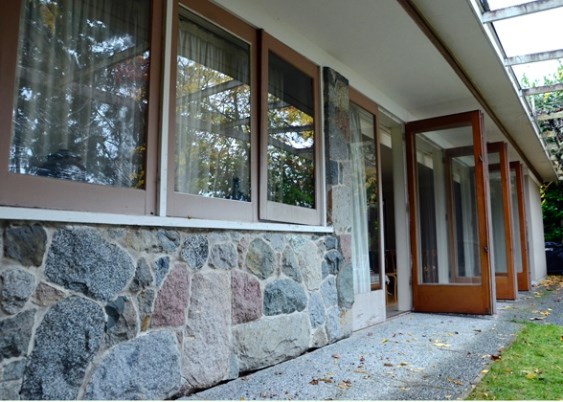The District of West Vancouver is stepping forward to possibly take over the historic B.C. Binning House from The Land Conservancy, the struggling non-profit that lost a bid in court to sell the home to a private buyer last month.
West Vancouver council members voted 7-0 Monday on a resolution that would see the municipality write to the conservancy to show interest in "ensuring the conservation of the B.C. Binning House." The district added that a formal proposal will be forthcoming.
Beyond that, staff will be looking into "alternative stewardship models" for caring for the home believed to be the first example of West Coast Modernism in Canada. The home was a gathering place for artists and architects inspired by Bertrand Binning until the death of Binning's wife Jessie in 2007.
The Land Conservancy was hoping to sell the 1941 home to a company owned by developer Bruno Wall, who approached the organization with an offer of $1.6 million and a promise to restore it to its original glory.
But heritage advocates, the District of West Vancouver's lawyers and the attorney general of B.C. lined up to oppose the sale in court on the grounds that it was transferred to the conservancy "on trust for the purpose of its preservation into the future for the public."
Wall's offer made no mention about preserving public access. Before the conservancy can make another attempt to sell the home it will have to prove it sought out alternative groups or private buyers willing to preserve the property for historical purposes.
The house, and other properties like it in West Vancouver, are deserving of more protection, argued Coun. Bill Soprovich.
"It's quite a unique little place and it's something we should take a look at," he said. "It's West Vancouver's pride. I think it's (high) time we find some kind of heritage council or status to go ahead and bring these places in. There could be more in the future."
But taking on the Binning House won't be an easy task if council is expected to pay market rate for it, Coun. Craig Cameron warned.
"We have so many budgetary challenges in the district right now and I don't know. .. if we have a lot of extra funds lying around to acquire properties," he said.
Bob Sokol, director of planning, responded the district's financial contribution would likely be limited to chipping in on some of the $200,000 needed to make repairs to the aging house. That could come from community amenity contributions from developers the district has set aside, while an outside agency could set up an endowment that will pay for ongoing maintenance.
The news was warmly greeted by Adele Weder, chairwoman of the West Coast Modern League and an expert in Binning's work.
"I think that's a wonderful, proactive discussion by the district. I think it's good news for everyone - certainly heritage advocates. I think it's a very bold leadership move and I support it," she said.
Weder, one of the early advocates of stopping the sale of the home to a private buyer, is hoping her group can assist with future stewardship plans. While it doesn't have the money to pay for the home's repairs Weder said the league could liaise with other groups and help organize fundraising.
"It could serve as an umbrella group for collaboration with other institutions - universities, schools, museums, galleries," she said.
Land Conservancy manager John Shields said he couldn't comment on the district's motion, as there is a process set up by the court monitor for evaluating interest and ability to take on the responsibilities of the house.



